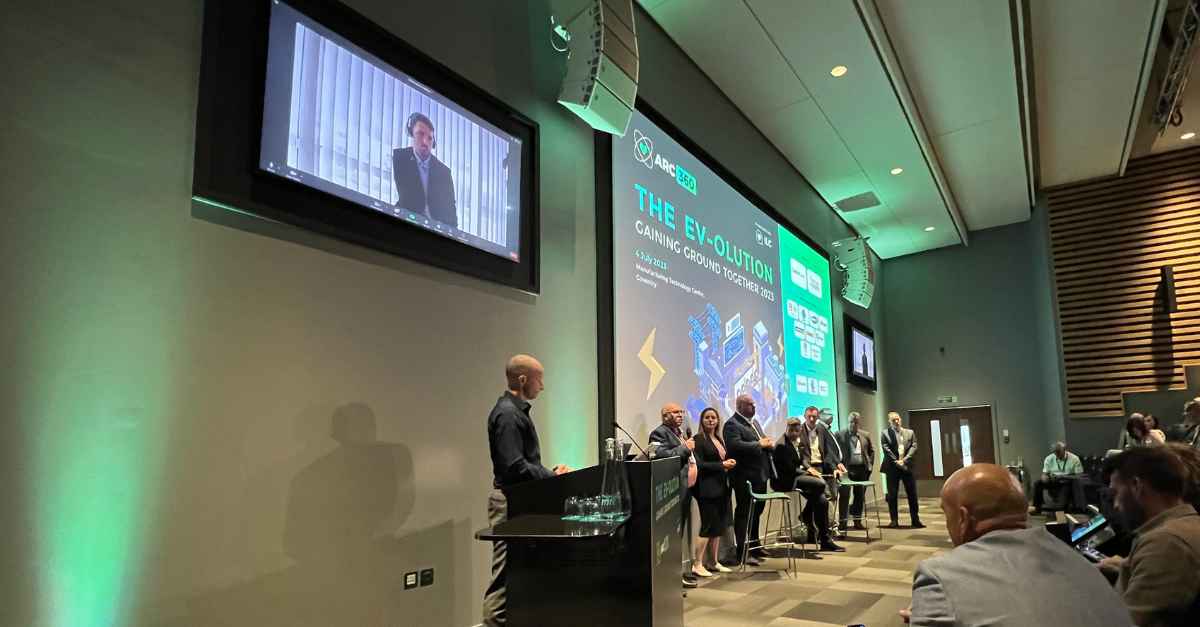While there remains some negativity towards electric vehicles and some doubt that they will own the future exclusively, EV Bodyshops and The Novo Group have proven that whatever challenges the technology presents can be overcome.
Adam Thurman, Managing Director, EV Bodyshops, and James Allenby, Managing Director, The Novo Group, took part in a session, What an EV future looks like, at ARC360’s specialist EV event, EV-olution, at the Manufacturing Technology Centre, Coventry.
They explained how their businesses had been established specifically for the EV market and the growth they have achieved in recent years shows that it is possible to manage EVs without compromising on customer service or profits.
Adam said, “EV Bodyshops opened two years ago as a dedicated EV repairer in north London. We don’t have EV bays, we are an EV workshop with trained technicians and strict processes. We have WiFi around the whole building to enable software updates and everyone in the business is a first aider because safety has to come first.”
Meanwhile, to protect the customer journey, if and when the vehicle goes to one of its dealer partners, EV Bodyshops has service level agreements in place to ensure that work begins within 24 hours.
Adam said, “We want to control the customer journey. We can do that when the car is in our workshop, but often you’ll find that once it goes to the dealership it disappears for a week or two. So we have SLAs in place to ensure that doesn’t happen. It’s just about doing things a little differently.”
Growth
Meanwhile, The Novo Group was established in 2015 as the UK’s only accident manager focused solely on EVs. It has since expanded its services and now offers motor insurance, claims management and repair services, while also operating its own fleet some 200 vehicles.
James said, “The industry is still quite negative towards EVs – insurers think they’ll catch fire and are expensive to repair. But when you’re working with them on a day-to-day basis you realise that a lot of the costs and inefficiencies are not down to the car or a lack of repairers, but with insurers themselves. We’ve been using a one-size-fits-all claims model for 30 years and it doesn’t work anymore.
“I think EVs represent a fantastic opportunity to make a sizeable change within the industry, and we know it can work because we’ve been through the pain points and have solutions, we’ve dispelled a lot of the myths and have the data to back it up, but we need to collaborate more. We’re still quite siloed.”
Batteries
Joining them in the session via video link was Raul Yustesepulveda, Global Account Manager – Battery Recycling, BASF.
He explained that a sustainable EV future will depend on battery production, and how BASF is developing its closed loop vision in battery supply and recycling.
Raul said, “BASF has a tradition of creativity and innovation towards the challenges society is facing. The biggest challenge we have in front of us now is sustainable e-mobility. BASF wants to be part of the solution so we have created a business, BASF Battery Recycling, to power a net zero future for e-mobility.”
He explained that end-of-life battery and cell recycling not only secures a sustainable supply of raw materials but also means BASF exceeds regulations such as the EU Battery Regulation, which will come into force in 2025 and stipulates that all automotive batteries need to be collected and treated.
Already established in Asia and America, BASF Battery Recycling is quickly expanding capacity in Europe and by 2030 Raul expects there to be 50 production factories on the continent able to handle and recycle a million tonnes of battery waste.
He concluded, “Battery recycling is crucial to the future and we are able to offer this service to our customers now.”
EV-olution was held with the support of sponsors Thatcham Research and Control€xpert, as well as Corporate Partners and Partners.

















